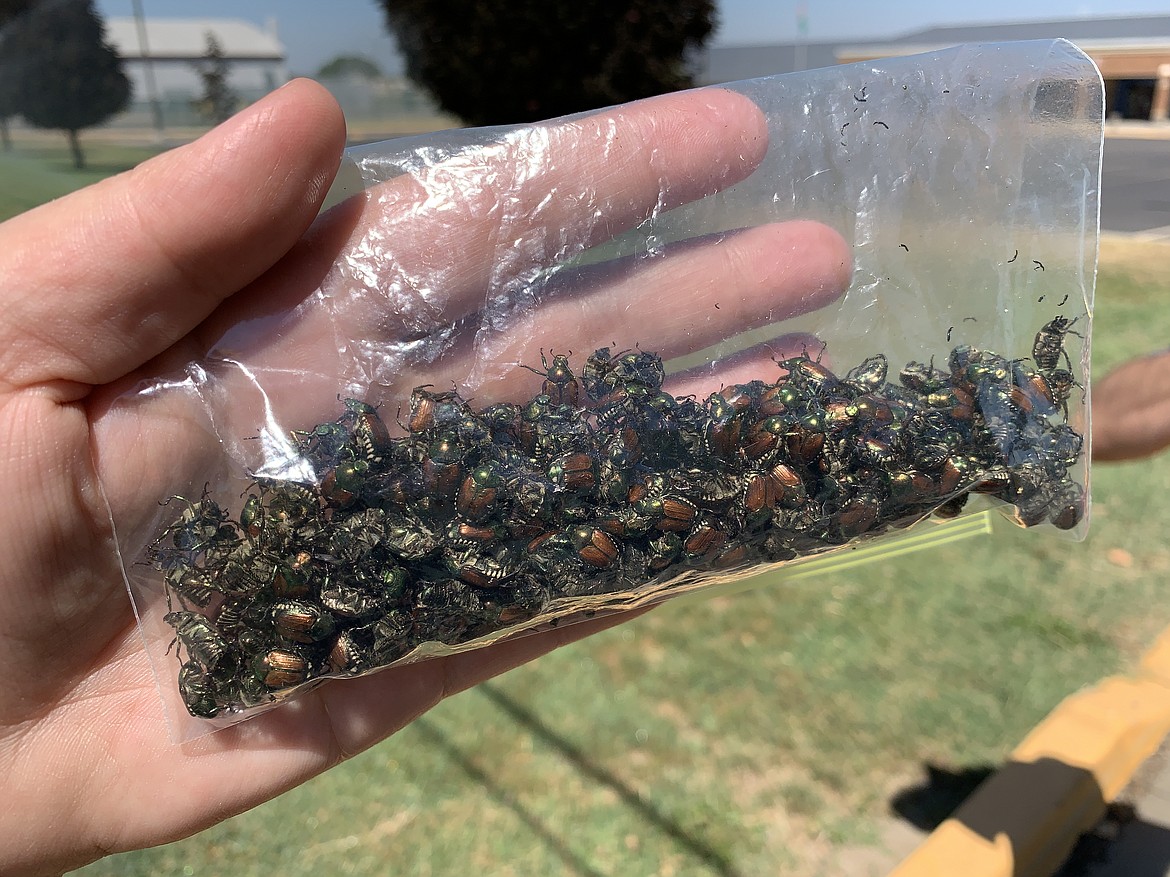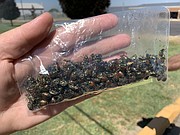Japanese beetles in Yakima Valley pose risk to region’s farms
CHARLES H. FEATHERSTONE | Hagadone News Network | UPDATED 3 years, 5 months AGO
GRANDVIEW — Japanese beetles may not be anywhere nearly as interesting as Asian giant hornets, but they could be a lot more dangerous.
The shiny green and copper-colored beetles are pretty little bugs, really, and you’re likely to find them on your roses if you find them anywhere.
But according to Karla Salp, a public engagement specialist with the Washington State Department of Agriculture (WSDA), they pose a far greater danger to agriculture in this state than any hornet — even a 2-inch-long one with a giant stinger.
“They eat over 300 different types of plants, and that’s the main concern for the Department of Agriculture,” Salp said. “They have the potential to do more damage sooner than the Asian giant hornet, and more direct damage.”
While Japanese beetles are endemic east of the Mississippi, they have not gained a foothold in Washington state, and the WSDA would like to make sure it stays that way.
“We have no idea how they got here, but it appears they have been here several years,” Salp said.
Salp said that WSDA employees caught as many as 2,000 of them in the Yakima Valley town of Grandview since WSDA started trapping the shiny green bugs on June 29.
“We trapped 415 on the first day,” Salp said. “That’s a lot of beetles.”
Adult Japanese beetles munch on leaves, Salp said, and while they are particularly fond of rose bushes, they will eat just about anything. And that includes crops important to farmers in the Yakima Valley — grapes, hops, apples, cherries and corn.
“Their absolute favorite thing is roses,” Salp said. “But they don’t attack the fruit directly. They like flower buds and leaves.”
However, the adult beetles aren’t the only threat. Salp said they lay their eggs in the ground, and when they hatch, the beetle grubs much on roots, and themselves are particularly fond of turf grass.
“They’re a real concern for nurseries and homeowners,” she said.
Currently, the WSDA is asking Grandview residents to put out beetle traps and report any catches or sightings along with a photo, noting Japanese beetles do not bite or sting, so they can be safely and easily collected.
The goal is to determine the extent of the beetle presence in the Grandview area, which appears to be centered on a cluster of schools.
Commercial beetle traps can be purchased at local hardware or garden supply stores or online, and any beetle caught should be reported to the WSDA at agr.wa.gov/beetles.
Washington State University advises homeowners wanting to kill adult beetles to apply any pesticide certified for Japanese beetles, as well as lawn treatments that can either kill eggs as they are laid or will kill the grubs as they develop.
As for WSDA dealing with the beetle infestation, Salp said that will have to wait until state agriculture authorities know the extent of the problem.
“Treatment is in the future, and it’s not something we will be doing this year,” Salp said. “But every female beetle collected takes one out of circulation.”
Which is more than 100 eggs not laid, grubs that won’t hatch, and rose bushes that won’t be nibbled and munched on.
Charles H. Featherstone can be reached at cfeatherstone@columbiabasinherald.com.
MORE FRONT-PAGE-SLIDER STORIES
ARTICLES BY CHARLES H. FEATHERSTONE

Potato prices up, sales down for first quarter 2023
DENVER — The value of grocery store potato sales rose 16% during the first three months of 2023 as the total volume of sales fell by 4.4%, according to a press release from PotatoesUSA, the national marketing board representing U.S. potato growers. The dollar value of all categories of U.S. potato products for the first quarter of 2023 was $4.2 billion, up from $3.6 billion for the first three months of 2022. However, the total volume of potato sales fell to 1.77 billion pounds in the first quarter of 2023 compared with 1.85 billion pounds during the same period of 2022, the press release noted. However, total grocery store potato sales for the first quarter of 2023 are still above the 1.74 billion pounds sold during the first three months of 2019 – a year before the outbreak of the COVID-19 pandemic, the press release said.

WSU Lind Dryland Research Station welcomes new director
LIND — Washington State University soil scientist and wheat breeder Mike Pumphrey was a bit dejected as he stood in front of some thin test squares of stunted, somewhat scraggly spring wheat at the university’s Lind Dryland Research Station. “As you can see, the spring wheat is having a pretty tough go of it this year,” he said. “It’s a little discouraging to stand in front of plots that are going to yield maybe about seven bushels per acre. Or something like that.” Barely two inches of rain have fallen at the station since the beginning of March, according to station records. Pumphrey, speaking to a crowd of wheat farmers, researchers, seed company representatives and students during the Lind Dryland Research Station’s annual field day on Thursday, June 15, said years like 2023 are a reminder that dryland farming is a gamble.

Wilson Creek hosts bluegrass gathering
WILSON CREEK — Bluegrass in the Park is set to start today at Wilson Creek City Park. The inaugural event is set to bring music and visitors to one of Grant County’s smallest towns. “I've been listening to bluegrass my whole life,” said the event’s organizer Shirley Billings, whose family band plays on their porch every year for the crowd at the Little Big Show. “My whole family plays bluegrass. And I just wanted to kind of get something for the community going. So I just invited all the people that I know and they’ll come and camp and jam.” ...





